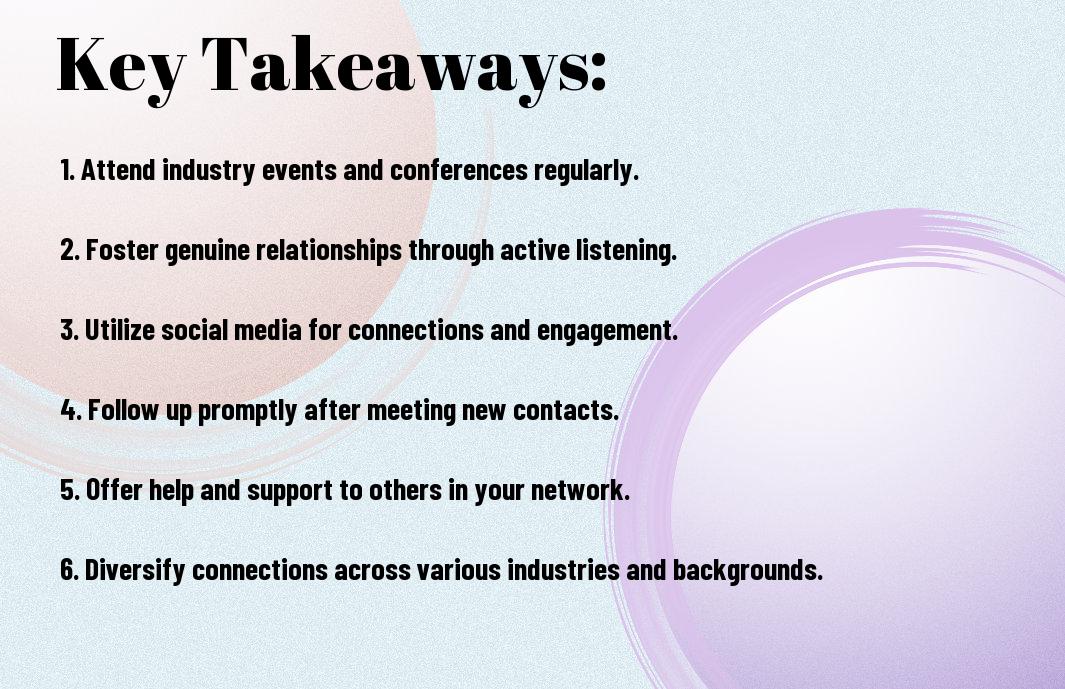Most successful professionals understand the importance of cultivating a robust business network. Building meaningful connections can open doors to new opportunities, collaborations, and insights that can enhance your career or business endeavors. In this post, you will learn effective strategies to expand your network, foster relationships, and leverage your connections for mutual benefit, ultimately helping you thrive in your industry. Whether you’re just starting out or looking to enhance your existing network, the following tips will guide you in creating a network that supports your professional growth.

Key Takeaways:
- Build Authentic Relationships: Focus on creating genuine connections with people rather than just transactional interactions.
- Leverage Social Media: Utilize platforms like LinkedIn to expand your network and stay in touch with industry professionals.
- Attend Networking Events: Participate in conferences, workshops, and meetups to meet new people and strengthen existing ties.
- Offer Value to Others: Share your knowledge and resources to help others, fostering goodwill and reciprocal support.
- Follow Up: Regularly check in with your contacts to maintain relationships and keep your network active.

Understanding the Importance of Networking
Your ability to connect with others in your industry can significantly impact your business success. Networking fosters relationships that can lead to new opportunities, collaborations, and valuable insights. By establishing a solid network, you position yourself to access resources, information, and support that may otherwise be unavailable, ultimately enhancing your professional growth and increasing the likelihood of achieving your business goals.
Benefits of a Strong Business Network
Between gaining industry insights and accessing potential clients, a robust business network serves as a powerful asset. It enables you to share knowledge, seek advice, and find collaboration opportunities that can propel your business forward. A supportive network also offers emotional guidance during challenging times, making it an imperative factor in not only professional but personal development.
Common Networking Myths
Common misconceptions about networking can hinder your efforts to build a strong professional community. Many believe that networking is solely about making transactional relationships or that it’s only necessary for those actively seeking a job. These myths can discourage engagement and limit the potential value of authentic connections.
Consequently, it is imperative to dispel these myths to fully leverage the power of networking. Real networking is about forming meaningful relationships and fostering a culture of mutual support. It’s not just about what you can get; it’s about what you can give. By shifting your mindset to view networking as an ongoing collaboration, you’ll discover numerous opportunities for growth, professional development, and success. Embrace the idea that every connection has potential beyond immediate gains, enriching both your career and the lives of those you meet.
Identifying Networking Opportunities
Even in a digital age, identifying networking opportunities can significantly impact your business growth. To expand your network effectively, you should actively explore various platforms and settings where professionals gather. This involves keeping an eye out for events in your industry, joining relevant online groups, and engaging with communities that share your interests. The more proactive you are in seeking these opportunities, the more likely you are to create meaningful connections that can benefit your business.
Online Networking Platforms
Beside traditional networking methods, online platforms provide a convenient way to connect with professionals worldwide. Utilizing sites like LinkedIn and Instagram can help you establish relationships, share insights, and showcase your expertise. Engage with content relevant to your field, join groups, and participate in discussions to increase your visibility and connect with like-minded individuals who may become valuable contacts.
In-Person Events and Conferences
Against the rise of digital connections, in-person events and conferences still hold significant value in networking. They allow you to interact face-to-face, build rapport, and discuss ideas in a more personal manner. Attending industry conferences, trade shows, or workshops can expose you to key players, potential clients, and collaborators, helping you create lasting relationships.
The benefit of attending in-person events and conferences lies in the opportunities they provide for establishing deeper connections. Engaging directly with individuals allows you to read body language, share genuine conversations, and foster trust more easily than through a screen. Make use of breakout sessions, roundtable discussions, and social gatherings to connect with fellow attendees. Don’t hesitate to introduce yourself and share your insights; after all, these exchanges can lead to fruitful collaborations and partnerships down the line.
Building Meaningful Connections
Despite the fast-paced nature of modern business, forging meaningful connections is necessary for long-term success. It’s important to nurture relationships that go beyond transactional interactions. Invest time in understanding your contacts, show genuine interest in their goals, and be open about your own aspirations. When you create authenticity in your connections, you enable collaboration and support that can significantly enhance your professional journey.
Effective Communication Strategies
Between busy schedules and constant distractions, effective communication can sometimes take a backseat. To ensure your message stands out, focus on active listening and engaging dialogue. Be clear and concise in your communication, whether it’s written or spoken. Always strive for an empathetic understanding of where your contacts are coming from, which will help you build rapport and trust.
Following Up with Contacts
An necessary part of network building is following up with contacts you meet. After initial conversations, don’t let the connection fade away; reach out within a few days with a personalized message. This not only shows your professionalism but also demonstrates that you value the relationship. Keep the conversation flowing by sharing relevant resources or updates on your projects.
Plus, consistently following up reinforces your presence in their minds and positions you as a reliable connection. Whether it’s a simple email or a coffee invitation, additional outreach can turn casual acquaintances into solid relationships. Keep your follow-ups personalized and genuine, and don’t hesitate to offer your help where you can. This reciprocal approach can only enhance your network, leading to potential collaborations and opportunities in the future.
Nurturing Your Network
All successful business relationships require ongoing effort and attention. Nurturing your network involves actively engaging with your connections, offering support, and finding ways to strengthen your relationships over time. This ongoing commitment not only fosters loyalty but also creates opportunities for collaboration and growth for you and your contacts.
Providing Value to Others
At the core of effective networking lies the principle of reciprocity. By consistently providing value to others in your network—whether through sharing knowledge, offering resources, or making introductions—you build a reputation as a generous and reliable contact. This approach fosters mutual respect and increases the likelihood that others will offer their support when you need it.
Maintaining Regular Contact
After establishing connections, it is vital to keep the lines of communication open. Regular contact helps reinforce relationships and ensures that you remain top of mind for your network. Whether through emails, social media updates, or casual coffee meetups, staying engaged allows you to be an active participant in your network.
Due to the fast-paced nature of business, your connections may easily lose touch if not actively engaged. By scheduling check-ins, sharing relevant articles, or simply wishing them well during significant events, you demonstrate your genuine interest in their success. Leveraging platforms like LinkedIn or using simple reminders on your calendar can help maintain this contact, ensuring a strong foundation for future collaboration and support.
Leveraging Social Media for Networking
Once again, social media serves as a powerful tool for building and nurturing your business network. By effectively utilizing platforms like LinkedIn, Twitter, and Facebook, you can connect with industry leaders, engage with peers, and showcase your expertise. Make sure to share valuable content, interact genuinely, and follow relevant accounts to expand your network and create meaningful relationships that support your career growth.
Optimizing Your LinkedIn Profile
Leveraging your LinkedIn profile is vital for effective networking. Ensure your profile is complete with a professional photo, compelling headline, and detailed summary that highlights your skills and experiences. Additionally, tailor your work history to reflect your achievements, and actively seek endorsements and recommendations to enhance your credibility within your industry.
Engaging with Online Communities
Beside optimizing your LinkedIn presence, actively engaging with online communities is a key strategy for effective networking. Participating in relevant forums, Facebook groups, and specialized communities not only allows you to share your insights but also enables you to connect with like-minded individuals who can offer support and collaboration.
Media platforms like Reddit or specialized forums provide you with an opportunity to demonstrate your expertise while learning from others. By contributing thoughtful comments or answering questions, you establish yourself as a knowledgeable resource within these communities. Focus on genuine interactions, and don’t hesitate to reach out to individuals you resonate with; these connections could lead to valuable professional relationships and opportunities down the line.
Measuring Networking Success
Now that you have established your networking activities, it’s necessary to measure your success. Analyzing the effectiveness of your connections and engagements will help you refine your strategies and achieve your business objectives. By understanding what works and what doesn’t, you can allocate your time and resources more efficiently, ultimately enhancing your networking efforts.
Setting Networking Goals
One of the first steps to measuring networking success is to set clear goals. Define what you want to achieve through your networking efforts, whether it’s finding new clients, developing partnerships, or enhancing your industry knowledge. Having specific, measurable goals will provide you with a framework to assess your progress and make necessary adjustments along the way.
Tracking Your Progress
To effectively evaluate your networking achievements, you need to track your progress consistently. This could involve keeping a log of connections made, follow-ups completed, and opportunities converted. Regularly reviewing this data allows you to identify trends, successes, or areas needing improvement, ensuring your networking efforts align with your overarching goals.
Networking is an ongoing process, and the more diligent you are in tracking your progress, the better you will understand your networking dynamics. You might consider using digital tools to keep everything organized or creating a spreadsheet to log details of your interactions. Analyze your results regularly and adjust your goals accordingly to stay on track and maximize your networking potential.
Final Words
With these considerations, you can effectively build a strong business network that enhances your professional journey. Focus on nurturing relationships, engaging with diverse groups, and offering value to others. Attend relevant events, utilize social media platforms, and maintain consistent follow-ups to keep these connections alive. Your efforts will not only expand your reach but also create opportunities for collaboration and growth in your career. By investing time in your network, you establish a foundation that supports your ambitions and propels you towards success.
FAQ
Q: What are some effective strategies to start building my business network?
A: To begin creating your business network, consider attending industry events, conferences, and networking meetups where you can connect with like-minded professionals. Utilize social media platforms like LinkedIn to find and engage with individuals in your field. Additionally, volunteering for organizations or participating in community activities can help you meet new contacts while enhancing your visibility.
Q: How can I maintain and nurture my business relationships over time?
A: To maintain your business relationships, regular communication is key. Schedule periodic check-ins via email or social media to stay updated on each other’s progress. Offer help when you can, whether it’s sharing resources, introducing contacts, or providing feedback. Participating in mutual events or scheduled meetups can also help keep the relationship active and strengthen the connection.
Q: What role does follow-up play in effective networking and how should I approach it?
A: Follow-up is necessary after meeting someone new to express gratitude and reaffirm your interest in staying connected. Sending a personalized message within 24-48 hours is advisable. Reference a specific conversation topic to jog their memory and suggest future engagement, such as meeting for coffee or collaborating on a project. This fosters trust and contributes to building a lasting business relationship.

